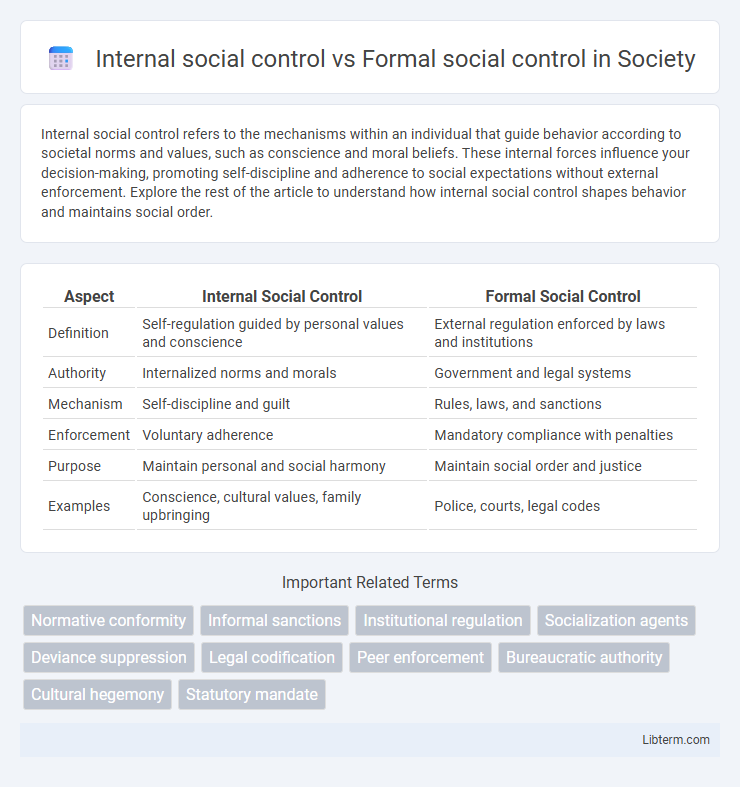Internal social control refers to the mechanisms within an individual that guide behavior according to societal norms and values, such as conscience and moral beliefs. These internal forces influence your decision-making, promoting self-discipline and adherence to social expectations without external enforcement. Explore the rest of the article to understand how internal social control shapes behavior and maintains social order.
Table of Comparison
| Aspect | Internal Social Control | Formal Social Control |
|---|---|---|
| Definition | Self-regulation guided by personal values and conscience | External regulation enforced by laws and institutions |
| Authority | Internalized norms and morals | Government and legal systems |
| Mechanism | Self-discipline and guilt | Rules, laws, and sanctions |
| Enforcement | Voluntary adherence | Mandatory compliance with penalties |
| Purpose | Maintain personal and social harmony | Maintain social order and justice |
| Examples | Conscience, cultural values, family upbringing | Police, courts, legal codes |
Understanding Social Control: Internal vs Formal
Internal social control operates through personal values, beliefs, and conscience that guide individual behavior without external enforcement, fostering self-regulation and moral responsibility. Formal social control relies on institutions like laws, police, and judicial systems to enforce norms and maintain social order through explicit rules and sanctions. Understanding social control involves recognizing how internal mechanisms promote voluntary conformity, while formal controls ensure compliance through structured authority and consequences.
Definitions and Key Differences
Internal social control refers to the self-regulation mechanisms individuals develop through internalized norms, values, and beliefs that guide behavior without external enforcement. Formal social control involves established institutions such as law enforcement, courts, and regulatory agencies that impose rules and sanctions to maintain social order. Key differences include the source of control--internal psychological processes versus external authoritative structures--and the methods used, with internal control relying on conscience and moral codes, while formal control depends on codified laws and official penalties.
Mechanisms of Internal Social Control
Internal social control operates through personal values, beliefs, and conscience that guide individual behavior without external enforcement. Mechanisms such as guilt, shame, and internalization of societal norms foster self-regulation and adherence to social expectations. This intrinsic self-monitoring contrasts with formal social control, which relies on rules, laws, and institutionalized sanctions to maintain order.
Mechanisms of Formal Social Control
Formal social control relies on institutional mechanisms such as laws, regulations, and official sanctions enforced by authorities like the police, courts, and government agencies to maintain social order. These mechanisms include codified rules, formal procedures for adjudication, and penalties ranging from fines to imprisonment. Unlike internal social control, which is driven by individual conscience and socialization, formal social control operates through structured and explicit systems designed to regulate behavior and ensure compliance within a society.
Agents of Internal Social Control
Agents of internal social control primarily include family, peers, and conscience, which guide individuals to conform through internalized norms and values. These agents influence behavior by fostering self-regulation, moral development, and a sense of responsibility, reducing the need for external enforcement. Unlike formal social control, which relies on institutions like police or courts, internal social control operates through personal and social relationships to maintain order.
Agents of Formal Social Control
Agents of formal social control include law enforcement agencies, judicial courts, and correctional institutions, which use codified laws and regulations to maintain social order. These agents possess the authority to enforce rules through sanctions such as fines, imprisonment, or probation, providing a structured mechanism for addressing deviant behavior. Formal social control contrasts with internal social control, which relies on individual conscience and socialization to regulate behavior without external enforcement.
Socialization and the Development of Internal Control
Internal social control arises through the socialization process, where individuals internalize societal norms, values, and expectations, leading to self-regulation and conscience development. Formal social control relies on external authorities, such as laws and regulations enforced by institutions like police and courts, to maintain order and compliance. The development of internal control during early socialization stages shapes an individual's behavior more sustainably than formal mechanisms, emphasizing the importance of family, education, and peer influences in norm internalization.
Legal Systems and the Role of Formal Control
Internal social control relies on individual conscience and moral values to regulate behavior, while formal social control involves established institutions such as legal systems that enforce rules through laws and sanctions. Legal systems play a crucial role in formal social control by codifying norms into statutes, ensuring compliance through courts, police, and correctional agencies. The effectiveness of formal control depends on consistent enforcement, legal clarity, and the legitimacy perceived by the public.
Comparing Effectiveness in Regulating Behavior
Internal social control relies on individuals' conscience and internalized values to regulate behavior, promoting self-discipline and long-term adherence to societal norms. Formal social control uses structured institutions like law enforcement and judicial systems to enforce rules through external sanctions, providing clear consequences for deviance but often requiring resource-intensive implementation. Studies show internal control fosters intrinsic motivation for pro-social behavior, while formal control is more effective in immediate deterrence, making a combined approach optimal for comprehensive behavioral regulation.
Social Control: Impacts on Society
Internal social control operates through an individual's conscience and internalized norms, guiding behavior without external enforcement, thereby fostering personal responsibility and social harmony. Formal social control relies on institutions such as law enforcement, legal systems, and regulatory bodies to impose rules and sanctions, maintaining order and deterring deviance on a broader scale. Both mechanisms impact society by balancing voluntary self-regulation with authoritative intervention, which supports social stability and conformity within communities.
Internal social control Infographic

 libterm.com
libterm.com